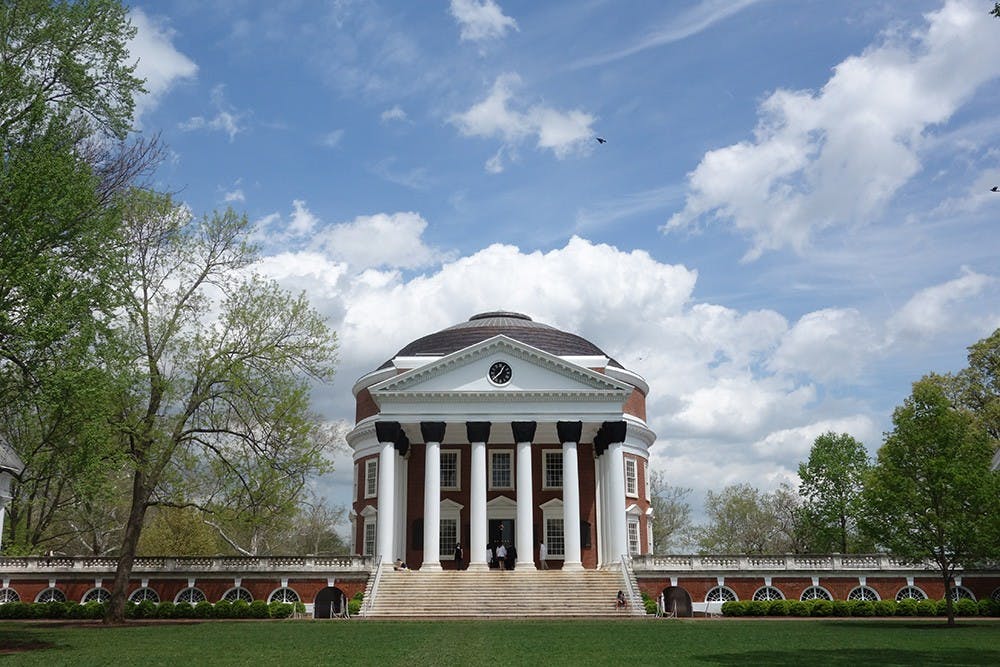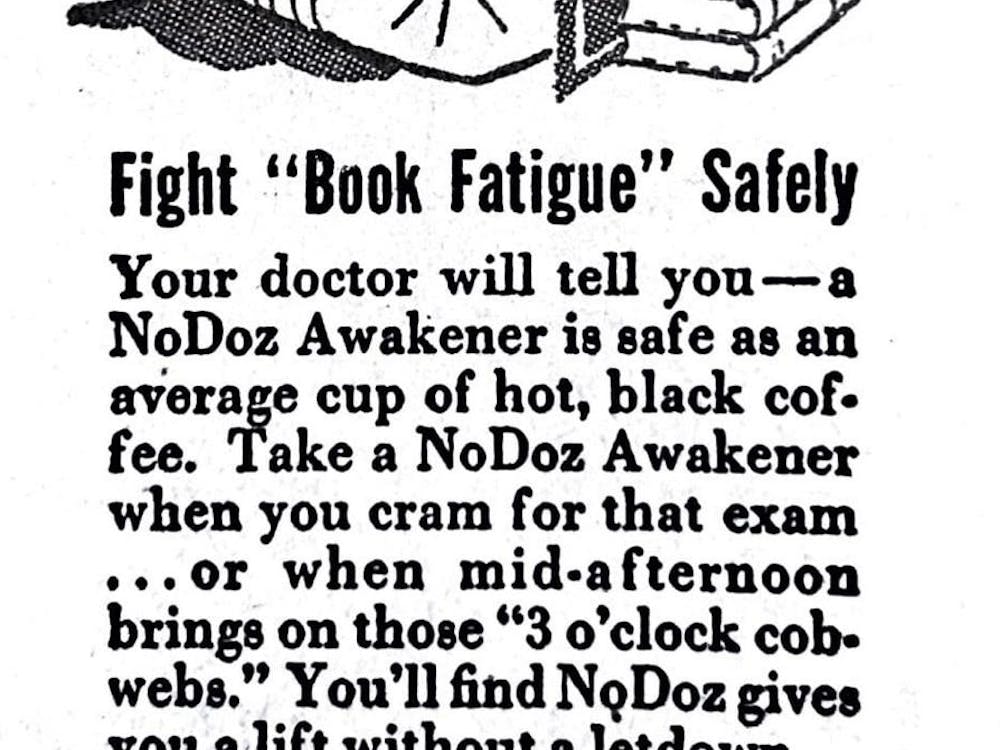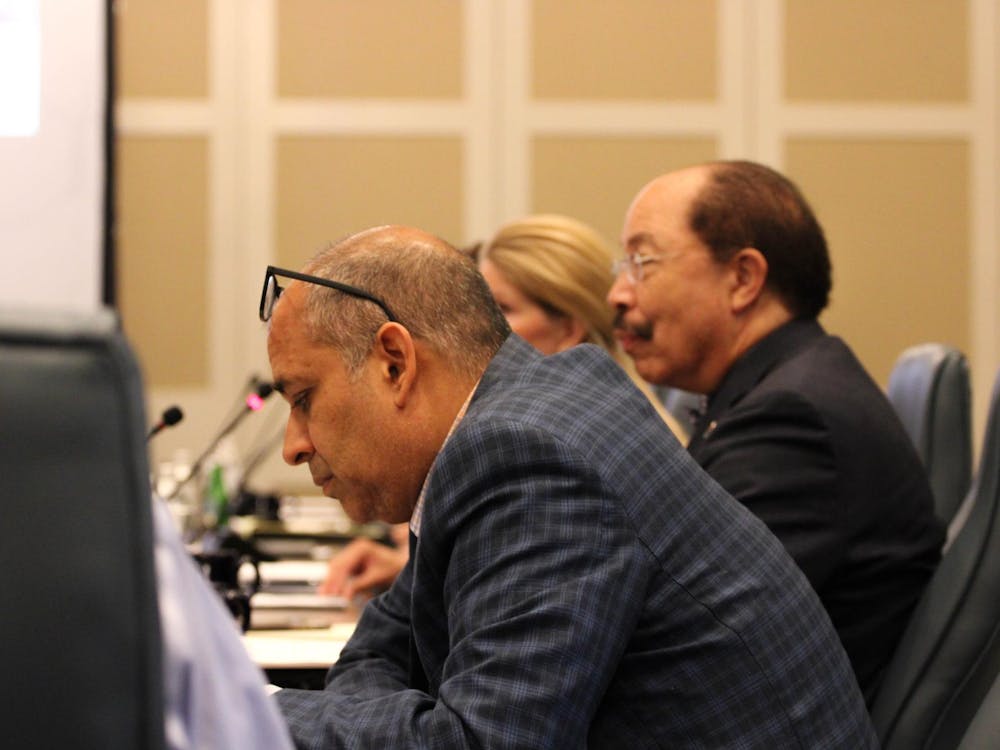When Rolling Stone's disturbing account of the alleged gang rape of a first-year University student, identified only as “Jackie,” was published online the morning of Nov. 19, the story quickly spread across Grounds. Read with a quiet anxiety by many who knew about the article's pending publication, the story soon picked up steam across the community at large — with Facebook timelines, Twitter feeds, and classroom web browsing dominated by the image of a girl, her head in her hands with illustrated blood striped across her body, and a domineering depiction of the Phi Kappa Psi fraternity house looming behind her.
The world, it seemed, quickly took notice. The heartbreaking story of Jackie's experience and the depiction of maddeningly unsympathetic friends and administrators captivated a wide audience who joined local advocacy groups in calls for justice, for reform and for revenge.
Now a month since the article's publication — the page boasting 179,000 Facebook likes and nearly 7,500 comments — questions about the article's central story have turned the ensuing discussion from one of horror to one of doubt and confusion, with an overwhelming desire to unearth new clues which might shed light on that nagging question: What really happened to Jackie that night?
Remembering Sept. 28, 2012
For third-year Engineering student Ryan Duffin — a friend of Jackie's who was depicted in the Rolling Stone article under the pseudonym "Randall" — reading through the story for the first time was shocking.
"She was shaking and her lip was
quivering and it really looked like she
had been through something terrible.”
As the article describes, he met up with Jackie on the night of her alleged gang rape, responding to a frantic late-night phone call. He had just returned from a performance with the Virginia Glee Club at an event at the Biltmore celebrating the University's spot atop Playboy magazine's list of party schools for the year. He found Jackie, sitting on the tables between Fitzhugh and Dunglison dorms, distraught.
"When I got there, she was sitting on a picnic table, and it looked like she’d been crying," he said. "She was shaking and her lip was quivering and it really looked like she had been through something terrible."
Dufflin called his friend Alex Stock — a fellow first-year student at the time who says he is "Andy" in the Rolling Stone article — who was out with their mutual friend Kathryn Hendley, also a first year. They left the party they were attending and walked back — though Jackie made clear, Stock said, she did not want Hendley — "Cindy" in the article — to come along.
"I thought that was really weird, obviously, because we were really good friends at the time and if she were upset I would have thought she would come to me first or at least at the same time as them," Hendley said. "So I went with him anyway."
As they approached, Duffin called Stock again and asked why he'd brought Hendley along. She opted to stay back while the two talked things over with Jackie, and ultimately she went home without ever directly discussing with Jackie what had made her so upset.
The night ended with Stock and Duffin sleeping on the floor of Jackie's Gooch dorm room. Both Duffin and Stock said they encouraged Jackie to call police, but ultimately she said she wanted to go home.
Noting discrepancies
That was the night as Duffin and Stock recall it — now more than two years later. But when the narrative resurfaced last month in the pages of Rolling Stone, the details were notably different. After reading the article, Duffin said "almost everything" was different from how he remembered.
The number of men involved in the incident had changed, Jackie's rape now involved vaginal penetration — rather than the forced oral sex she recounted to him and Stock in 2012 — and she said her date was stopping by the fraternity house to pick something and asked her to accompany him inside, not that she was attending a party at the house, as Rolling Stone published.
"I didn't realize it was even
that bad on the 28th."
Upon reading the narrative, Duffin said he was surprised by the discrepancies — and despite these differences he, like many in the University community, believed what he read.
"I thought that it was possible that on the 28th that Jackie had kind of downplayed what she was telling me, either as a personal rationalization technique, or just to kind of test the waters and see how I’d respond to her telling me about this," he said. "So I believed the account in the article once I’d read it first, too. I didn’t realize that it was even that bad on the 28th."
In the intervening weeks, Duffin said he has grown more skeptical of Jackie's account. The discrepancies he knows from his personal encounter with her, coupled with Rolling Stone's retraction and Phi Psi's statement finding key discrepancies through an internal investigation have cast a shadow of doubt across the entire narrative.
In a series of interviews with The Washington Post, Jackie stood by most of her story — stepping back slightly on the specific fraternity in question but maintaining the general facts of the narrative. An email sent to reporters last week from Jackie's attorney, Palma Pustilnik, said Jackie and her family will not be commenting further on the matter.
Fast Friendships & Romantic Encounters
The weeks leading up to Sept. 28, 2012 were filled with college firsts for the group of four friends — who Hendley said rarely spent more than 24 hours apart.
Hendley, who met Jackie through her neighbor before school started, met both Stock and Duffin at summer orientation, and the four — though they each lived in different dorms — were very close in the first weeks of school.
Stock said they wanted to talk to him
because having an upperclassmen romantic
interest was "a big deal for Jackie.”
Early in September, Jackie began talking about a new romantic interest — a third-year student in her chemistry class who she said had expressed interest in her and was named Haven. Haven was the man Jackie said she went on a date with Sept. 28 — the one who lured her into the fraternity house.
Both Stock and Duffin asked for his phone number in early September, which Jackie promptly provided. Stock said they wanted to talk to him because having an upperclassmen romantic interest was "a big deal for Jackie."
When the two began texting Haven, both pretended to be female students from his chemistry class.
"I think it was a very thin disguise, because I didn’t know what I was doing," Duffin said.
The conversations were sporadic — and only later did Duffin realize that he and Stock had received different numbers to contact Haven. The Washington Times has subsequently reported that the numbers were all registered with online services which "enable people to text without cellphone numbers but also can be used to redirect calls to different numbers or engage in spoofing."
Stock says he suspects now he may have been communicating with Jackie using a fake number. But at the time, he said he had little reason to suspect anything was wrong with her story — except for the fact none of the three of them could find him on Facebook.
The Washington Post reports that pictures sent from the phone number to Duffin, ostensibly of Haven, are actually pictures of Jackie's high school acquaintance, and that no man by the name Jackie provided had ever been enrolled at the University.
Following Sept. 28
Hendley, Stock and Duffin all said Jackie did seek help soon after her alleged attack — though she told them the individual she spoke with was unhelpful and blamed her for the assault. The three each offered different guesses as to who Jackie had sought help from, but all were confident she had told them she visited someone.
Duffin spoke with his Resident Advisor at the time who advocated respecting Jackie's desires for privacy, but otherwise none of the three friends brought the issue to University or police authorities.
"I should've though, in retrospect," Hendley said.
Duffin said that after the incident, Jackie “seemed fine, almost consistently.” He did, however, notice occasional “episodes” in which she seemed to remember and react to her memories.
“She would kinda just take a quick glance around the room, and her lips would quiver a little bit, and you could see that she was thinking about the 28th,” Duffin said. “But then after about five or six seconds, she would snap back to being completely normal and it seemed like nothing had happened. If you didn’t know, you wouldn't have guessed.”
"Her lips would quiver a little bit
and you could see that she was thinking about
the 28th. But then after about five or
six seconds, she would snap back.”
Hendley said Jackie's semester after Sept. 28 seemed relatively normal — it was toward the end of the semester when she noticed Jackie wouldn't leave her dorm room.
"She would sometimes reference [her assault], but I didn’t want to bring it up," she said. "I don’t really know how to bring that kind of thing up, but if she ever said anything about it, of course, I would be supportive.”
Hendley said the two had a class together the following semester, but Jackie was rarely in attendance.
The friendships eventually faded. Hendley said Jackie started a personal rumor about her which created a chasm in their friendship.
She said she tried to reach out to Jackie after the article was published but wasn't able to get through.
Duffin said he texted Jackie when the article was first published to let her know he still supported her. Her lawyer has since recommended she not speak with him, he says, and he hasn't been in contact since.
Choosing to come forward — a call for continued advocacy
Hendley said she was troubled after reading the article — which describes her as a “self-proclaimed hookup queen” who callously advocates against calling the police because it would make Jackie "the girl who cried rape."
"I know that it’s not based in fact, but it’s weird to think other people think of you like that," she said. “It’s kind of a weird out-of-body experience.”
Hendley said she felt personally attacked by her representation in the article.
"The whole article wasn’t targeted toward me, but she made some very disparaging remarks about me, and I don’t really know why she would do that, to me specifically," she said. "Like, Alex and Ryan, she made them seem kind of bad, but she made me seem really awful.”
"I've spent more time with news
crews this week than I spent studying
for or being in my finals.”
Stock was the first of the trio to speak with the press — after a Washington Post reporter reached out to him. Duffin and Hendley quickly followed suit — the ensuing media firestorm clashing with their finals schedules.
"I’ve spent more time with news crews this week than I spent studying for or being in my finals," Duffin said. "And I’m really nervous to check my grades on SIS now because of it."
All three said they immediately recognized the story and themselves when they read through the Rolling Stone account, despite the discrepancies in the narrative. Ultimately, Hendley said, it is important to set the record straight — so long as it does not distract from the broader issue of combating sexual assault on Grounds.
"Personally, I don't care whether it's
true or not, because I think it's much
more important that people be looking
at the larger issue.”
"The reporting and the storytelling is a problem, but [they have] furthered the conversation about this whole thing," she said. "And now people are focusing on who lies about sexual assault instead of protecting those who have endured sexual assault, which is a lot more important."
Stock and Duffin expressed similar desires to see the ensuing dialogue fixated more squarely on addressing sexual assault than correcting Jackie's narrative.
"Personally, I don’t care whether it’s true or not, because I think it’s much more important that people be looking at the larger issue," Duffin said. "Up until Rolling Stone backed up on the article, everyone was taking the article as being fact. ... People accepted that this was something that could happen at U.Va., and that in itself, I think, underlines what the larger problem is — which is that sexual assault still happens at U.Va., and still happens at a lot of places that aren’t U.Va., too."
Duffin added he hoped the fallout from Jackie's story would not discourage other survivors from coming forward to share their stories — a concern echoed by many student leaders in sexual assault prevention and advocacy groups on Grounds.
The fallout
Since the three have come forward, and Phi Psi and Rolling Stone have issued their statements, the national attention has turned fiercely toward Jackie and her account. The attention brought the scorn of many who slammed Rolling Stone for poor journalistic practices and sloppy fact-checking. Others have turned anger toward Jackie — with one blogger choosing to identify her by her full name and a second Twitter account tweeting out her full name, home address and phone number before the account was banned.
"I think when I saw that happening, that was the angriest I’ve ever remembered myself being in recent memory," Duffin said. "Because I think that’s just an absolutely despicable thing to do."
The released information appears to have been largely obtained from a digital copy of the University directory, uploaded online by a company called Around Campus Group. Vice President of Student Affairs Pat Lampkin said earlier this month she was aware of the website and was working to have it removed. It was taken down by Dec. 9.
University President Teresa Sullivan asked Charlottesville Police to investigate the incident described in the Rolling Stone article after it was published. Duffin spoke with police before meeting with members of the press, and Stock has subsequently spoken with police. As of last weekend, Hendley had reached out to police but had not heard back with any further communication regarding the incident.
Both Duffin and Hendley said Sabrina Rubin Erdely, the author of the Rolling Stone piece, has reached out to them to apologize.
Uncertain Beliefs
Moving forward, all three friends said they still believe it is possible something traumatic did happen to Jackie that night.
"I think that all the possible ways you could explain this incident, all deserve investigation, because I really don’t know what to think," Duffin said. "And the only person who really knows for sure is Jackie."
Stock said evidence seems to pull in different directions.
"I don't know what to believe honestly, he said. "I understand a traumatizing event can cause someone's memory to jumble up a little bit, but there have been some major inconsistencies — including stuff she said before the event, including sending us pictures of a guy who doesn't even go to U.Va. — that could not conceivably have been related to the trauma. … The flip side of that coin is that she did seem really upset that evening. If she was acting, it was a very good performance."
"I do believe that something happened,
but it was all very exaggerated.
So the exact truth of it, I'm not so sure.”
Stock said theories attempting to explain the discrepancies between the night of Sept. 28 as he remembers it and the account in Rolling Stone “hit a wall.”
“Why does she come back to Rolling Stone two years later and make it a huge deal?” Stock said. “That's where I'm having trouble.”
Hendley said she has reasons to doubt much of Jackie's claim — including, of course, the misrepresentation of her own involvement. But she's not prepared to dismiss the entire trauma.
"I do believe that something happened, but it was all very exaggerated," she said. "So the exact truth of it, I’m not sure.”
Hendley, Stock and Duffin all said they are learning new information from reporters about the events of Sept. 28, 2012, a night they had not critically examined until recently.
“I’m just continuing to piece [it] together,” Duffin said. “Because it’s constantly changing the way that I’m viewing the story, and this is something that for two years, unquestionably, I was like, ‘Yeah that happened.’”
Rebecca Lim contributed to the reporting of this article.







